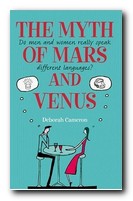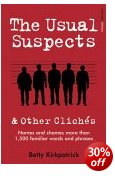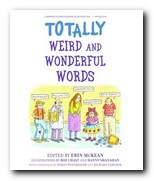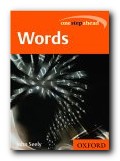Do men and women really speak different languages?
A notion has sprung up in the last decade or so that men and women use language differently – even that they are psychologically and genetically hard-wired for language in different ways. This notion has solidified around the expression ‘Men are from Mars, Women are from Venus’, which was the title of a book which became a best-seller in 1992. This current book is Deborah Cameron’s exploration of gender and language from the perspective of an academic specialist in the field.
 Not to hold back on her conclusions unnecessarily, she points out that the notion is complete rubbish. There isn’t any proof or justification for it in any of the published research. There are only vague ‘surveys’ and pop-journalism which make claims which evaporate under the scrutiny of rigorous examination. So the question immediately arises – why is this myth so widespread and enthusiastically accepted as a universal truth? Why do people continue to believe it, when it’s not true?
Not to hold back on her conclusions unnecessarily, she points out that the notion is complete rubbish. There isn’t any proof or justification for it in any of the published research. There are only vague ‘surveys’ and pop-journalism which make claims which evaporate under the scrutiny of rigorous examination. So the question immediately arises – why is this myth so widespread and enthusiastically accepted as a universal truth? Why do people continue to believe it, when it’s not true?
The answer to that question is that like most myths, it is comforting. It panders to prejudice and reinforces stereotypes of both men and women. And it spares us the difficulty of looking more closely at what we think we are observing.
She looks at all sorts of research into the relationship between language and gender, and it all points to the same conclusions – that for any investigation, the context needs to be given; that larger samples need to be taken; that general conclusions about choice of vocabulary, volume of speech, interrupting, and verbal dominance cannot be made on grounds of gender without many other factors being taken into account.
Rather than speaking differently simply because they are women and men, women and men may differ in their patterns of language-use because they are engaged in different activities or are playing different conversational roles.
What one person thinks of as a supportive tag question (isn’t it?) is another person’s facilitation. It all points to the need for more scientific rigour before making rash claims.
The most serious argument she makes is that giving credence to these myths can be a dangerous reinforcement of prejudice against both men and women which when translated into social action can result in discrimination, persecution on gender lines, and even social exclusion.
She also backs up her claims with excursions into sociology and ethnography, illustrating the point that behaviour which is often seen as essentially gendered is just a different way of responding because of a particular role being enacted – irrespective of gender.
She actually takes this further, into areas which seem to border on the philosophy of human existence in a way which reminded me very much of the work of Stephen Pinker. The ‘explanations’ of language/gender difference which stem from Stone Age evolutionary psychology are examined under her clear, realistic gaze and shown to be wanting.
This is only a short book, but there are thought-provoking ideas on just about every page.
© Roy Johnson 2008
Deborah Cameron, The Myth of Mars and Venus: Do Men and Women Really Speak Different Languages, Oxford: Oxford University Press, 2008, pp.208, ISBN: 0199550999



